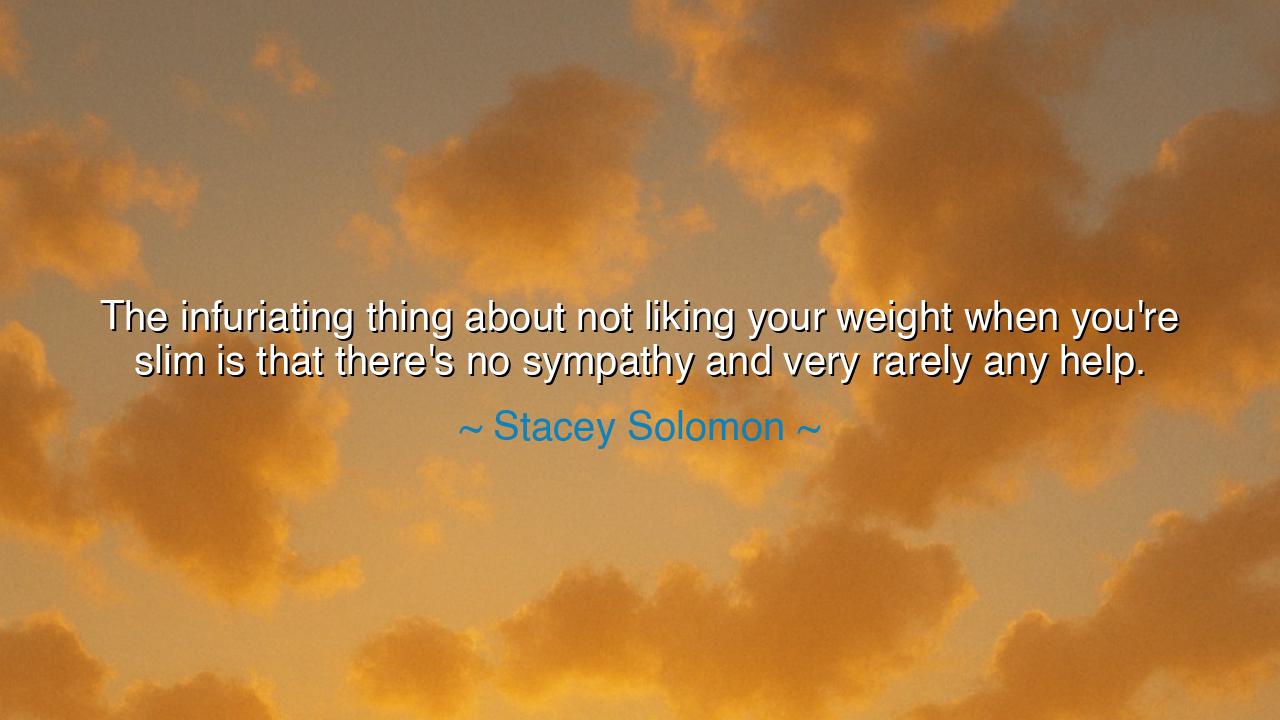
The infuriating thing about not liking your weight when you're
The infuriating thing about not liking your weight when you're slim is that there's no sympathy and very rarely any help.






When Stacey Solomon declared, “The infuriating thing about not liking your weight when you’re slim is that there’s no sympathy and very rarely any help,” she touched upon a truth often hidden in silence: the suffering that goes unseen, the pain that is dismissed because it does not fit the common expectation of hardship. Her words reveal that even those who appear to have what society praises—slimness, beauty, outward health—may still carry a storm within. Yet because the world sees only the surface, it withholds compassion, leaving the sufferer alone in their struggle.
The origin of this struggle is as old as humanity itself. From ancient times, societies have measured worth by outward form: the strength of warriors, the grace of maidens, the stature of kings. In every age, there have been standards of beauty and ideals of the body, often unforgiving and narrow. To appear to meet these standards is seen as a blessing; yet the hidden truth, as Solomon unveils, is that even those who seem to fit the mold may feel deep dissatisfaction, insecurity, or pain. And because their struggle is invisible to others, they receive no sympathy and often no help.
Consider the life of Princess Diana, who, though adored by millions for her beauty and grace, secretly battled an eating disorder. To the world, she was radiant, slim, the very image of elegance. Yet within, she wrestled with feelings of inadequacy and despair. Few offered her compassion, because her suffering was not visible in the ways people expected. Her story mirrors the truth in Solomon’s words: that society often denies care to those who outwardly appear to have what others desire, forgetting that the heart’s pain does not always show on the body’s surface.
The meaning of this quote is deeply emotional: it speaks of the loneliness of struggles that others do not recognize as valid. When one who is slim speaks of disliking their weight, the world often replies with dismissal—“You have nothing to complain about”—instead of understanding. But pain cannot be measured by comparison. To tell a soul that their suffering is unworthy of sympathy is to deepen the wound. Solomon reminds us that all pain is real, all suffering deserves compassion, whether it fits our expectations or not.
The lesson for us is powerful: never assume that because someone looks “fine” on the outside, they are untroubled within. Behind every face may lie a silent struggle. Do not measure whether a person is worthy of sympathy based on how their pain appears to you. Instead, practice empathy without judgment. Listen when others speak of their struggles, even if you cannot understand them, even if they do not resemble your own. Compassion withheld is a burden added to an already heavy heart.
What, then, should you do? First, resist the instinct to dismiss the pain of others because it does not look like the pain you know. Second, offer sympathy freely, for it costs you nothing and may mean everything to someone else. Third, if you yourself struggle with hidden dissatisfaction, speak your truth boldly, even if others fail to understand. Seek those who will listen with open hearts, and know that your pain is no less real for being misunderstood.
Thus, let Solomon’s words echo as a teaching for generations: “There’s no sympathy and very rarely any help.” May we not let this remain true. Let us broaden our vision of compassion, seeing beyond appearances, honoring the unseen struggles, and offering help where silence once reigned. For the strength of a society is not in how it treats the obviously wounded, but in how it tends to the hidden wounds that others ignore. To give sympathy where none is expected is to give healing where it is most needed.






AAdministratorAdministrator
Welcome, honored guests. Please leave a comment, we will respond soon